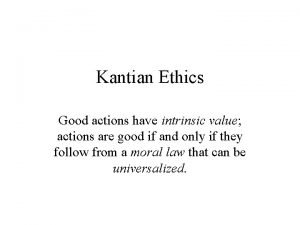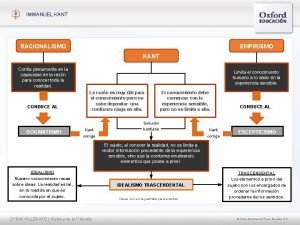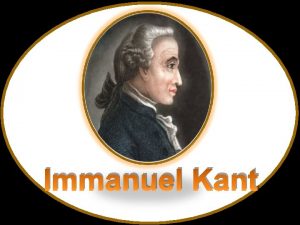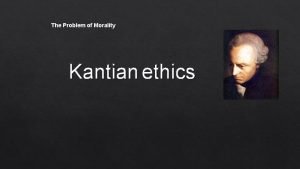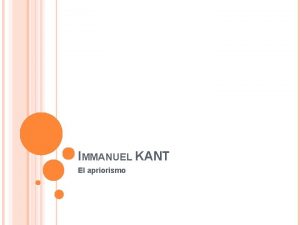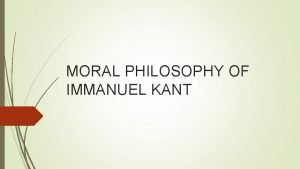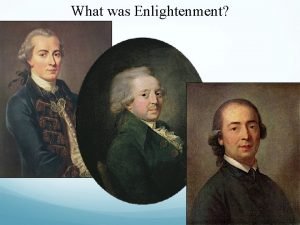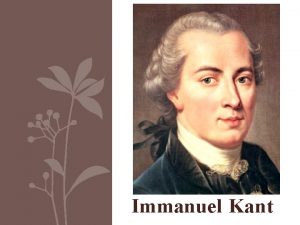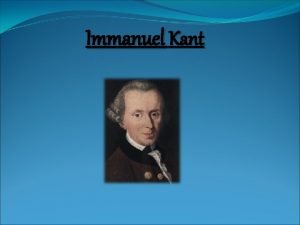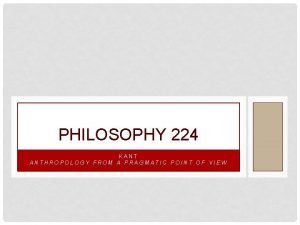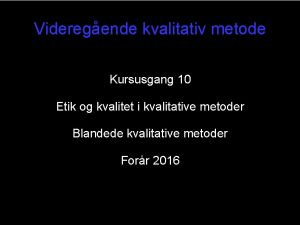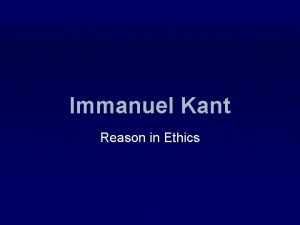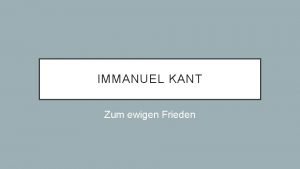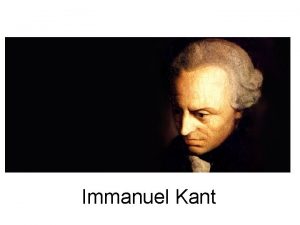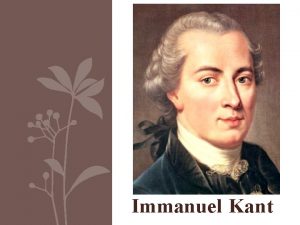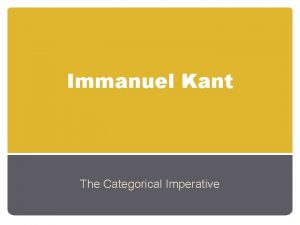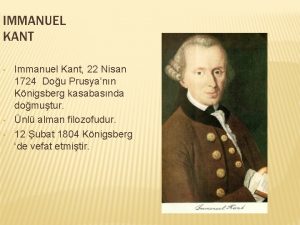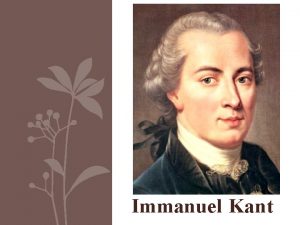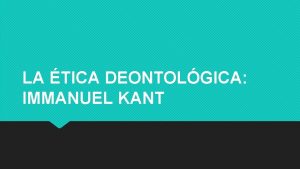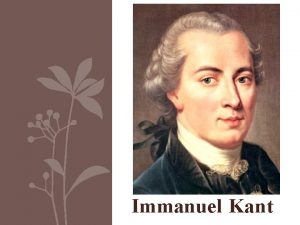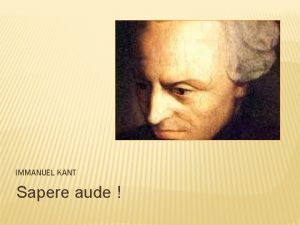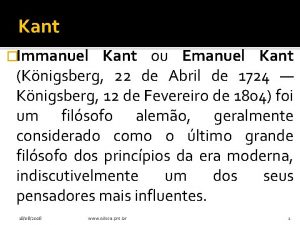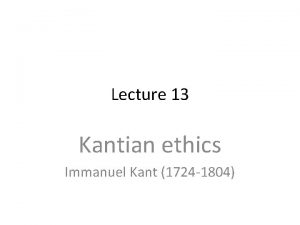Kantian Ethics The Moral Philosophy of Immanuel Kant



















- Slides: 19

Kantian Ethics The Moral Philosophy of Immanuel Kant The Ethics of Duty and Reason

Immanuel Kant (1724 -1804) German philosopher Concerned with duty and reason Believed that the intentions behind an action were more important than the consequences. We cannot predict the consequences so we cannot judge a person good or bad based on the consequences of their actions. Text - The Metaphysics of Morals 1797

A Deontological Theory Task: Round Robin Deon = duty (Greek). A theory based on our duty or our obligation to do something. This is an approach to ethics that focuses on the rightness or wrongness of actions themselves, as opposed to the rightness or wrongness of the consequences of those actions. First person – pro to deontological ethics Start with the youngest group member and travel clockwise around your table. Second person – a con of deontological ethics And so on … Task: Write up a pro/con list in your books.

Influences - Plato Kant believed that there were concepts such as ‘good’ and ‘justice’ that are real and have a universal truth. He believed that we can learn about and access this through our reason and a priori knowledge. We do not gain this knowledge from sensory experience or empirical knowledge they exist independent and prior to human understanding and existence and we as rational beings must use our reason and intelligence to find out what is the good or just thing to do. We have animalistic inclinations and desires that we must avoid. Discuss: what did Plato say about the nature of the soul? Reason Desire Emotion

Kant’s view of Human Nature Kant’s understanding of human nature is best appreciated within the context of: Animals Desires Inclinations Animals follow their desires and inclinations only. They have no reason, so behave in accordance to the empirical realm of cause and effect, led by their appetite and instincts. Phenomenal Realm Human Beings Desires & Reason God / Angels Reason Human nature experiences the tension of desires and inclinations (their animal self) versus the voice of reason (their God-like self) Phenomenal and Noumenal Realm God angels are perfectly rational beings, without appetites and desires to lead them astray from following reason and objective moral laws. Noumenal Realm

Human Nature and Reason Basics: Questions: Good Will can only result from 1. Explain what Kant said about the nature of God angels. the proper use of reason We must eliminate our own desires and needs from the decision and make it in everyone’s best interests Objective – not subjective in our approach A priori as opposed to a posteriori Kant believed that humans have two parts to their nature: desire and inclinations verses reason. Reason accesses the path to good will and moral actions. Investigate 2. Explain Kant’s ideas about the nature of humans 3. Explain Kant’s thoughts on the nature of animals. 4. Explain what Kant meant by the tension between our animal and God-like self. 5. Where might Kant’s ideas on humans being ‘God-like’ come from?

Duty: Ought Means Can A moral person is one who acts from a sense of duty and not from what we personally would like to do. Acting morally amounts to doing our duty regardless of what consequences may follow, even for ourselves. Task: Kant states that if we know something is out duty and we ‘ought’ to do it, no consideration of our own desires or negative consequences to ourselves should ever get in the way. 1 Give 3 examples of duty We cannot allow our subjecting emotions to prevent us doing our duty. 4 Explain 2 problems with the concept of duty in moral decision making This links back to the difference between animals and humans – we are not driven by just our subjective desires and fears. 5. Do you think this sets a high moral standard? Is this a good thing? 2 Is duty always easy to follow? 3 Give an example of a difficult duty

Good Will ‘ The Good Will shines through like a precious jewel’ Kant stated that: Task: 1. Give two examples of actions solely grounded in good will. All good moral acts must be grounded in good will. Humans have an innate inclination towards good will. 2. Do you think humans are Good will indicates that the act was carried out with the best capable of pure of intentions. good will without self interest as a Kant believed we must trust in the rational good will of humanity that we will turn these maxims and ideals into moral laws. motivation? Good will indicates a good action not because ultimately the consequences are good but because the intention is good in itself. Good will is the sole intrinsic good – all others like courage or pleasure could be used with wicked intentions. Where as good will by its definition always has good intention as its motivation. Sense based experience can lead us astray due to desire and emotions. Our Reason can lead us to the logical moral choice. 3. Use the QR Code – what does Hobbes think of human nature?

Autonomy v Heteronomy Task: Define the terms Heteronomy and Autonomy Kant’s views on autonomy were influenced by many thinkers – Rousseau being one. Kant thought that we needed to be freely using our reason and a priori logic in order to be truly good. Otherwise we were just following authority or fear. However, we did still need strict categorical imperatives to use in reasoning what we should do. ‘Enlightenment is man’s emergence from his self imposed nonage. Nonage is the inability to use one’s understanding without another's guidance. This nonage is self imposed if its cause lies not in a lack of understanding but in indecision and lack of courage to use one’s mind…Sapere Aude! Dare to know!’ Task: Explain this in 2 bullet points

Autonomy v Heteronomy Task 1: 1. Give two examples of heteronomy. 2. Explain why Kant thinks autonomy is important for moral decision making. 3. Why does Kant think heteronomy does not allow for true morality? 4. How could the historical context of Kant have affected his thinking on autonomy? Task 2: ‘Autonomy is required for true morality’ A: support this statement with a reason and example. B: criticise your above point argument. Challenge: what does Hobbes mean by this? Does this support autonomy? ‘For the laws of Nature (as justice, equity, modesty, mercy, and, in sum, doing to others as we would be done to) of themselves, without the terror of some power, to cause them to be observed, are contrary to our natural passions, that carry us to partiality, pride, revenge and the like. ’ (Hobbes, Leviathan)

The Three Postulates – Key Revision Point! Freedom –Kant thinks freedom and Autonomy are so important in morality and our ethical choices. You should be able to say why! Immortality – Kant postulates that if we are moral then we should be happy and flourish as a person. This does not always happen in the material world as good people that do their duty still suffer. So Kant suggests to us that in order to achieve Summum Bonum their must be an afterlife in heaven. Links to Philosophy! God – If there is a heaven there must be a moral judge to decide who will be granted access, this Kant says, is God.

Hypothetical Imperatives are instructions; they tell us what to do. Kant distinguished between two types of imperative: hypothetical and categorical. Hypothetical imperatives tell you or let you hypothesise what to do in order to achieve a particular goal “If you don’t want to go to prison, then don’t steal cars”. Hypothetical imperatives focus too much on the goal that a person wants to achieve. The motive is to benefit or pursue a desire. This is fine in life unless we are making a moral choice – Kant says morals are different. Categorical imperatives, unlike hypothetical imperatives, tell us what to do irrespective of our desires. To be moral Kant thinks we should avoid HI and that we should think “Don’t steal cars!” We ought not to steal cars whether we want to stay out of prison or not.

Categorical Imperatives These are three most important considerations that Kant said we must use when deciding and reasoning what the moral action that we should take is. 1. Universalisability 2. Treat People as an end in themselves, not as a means to an end. 3. Aim to create a Kingdom of Ends.

Categorical Imperatives Watch the Video: Make notes on each of the Categorical Imperatives Are the categorical Imperatives useful? Be ready to feedback

Over to You …Extended Writing Task For each of Kant’s Categorical Imperatives: Describe and Explain the categorical imperative Apply it to and example to show it might work Evaluate – What could be beneficial about this moral premise? Evaluate – are there any potential problems with this categorical imperative? Your Evaluation – is it good/bad and why?

1. Conflict of Duty All deontological ethical theories have this problem of conflict. If they state that a duty is absolute, for example do not kill then also state we must defend the vulnerable we can see how in real life there will be a conflict as we try to decide what to do. In this situation Kant is criticised as he does not tell us what to do when faced with a moral dilemma or a conflict like this. We could create a sub rule, so ‘do not kill unless…. . ’ but this could be a very lengthy and complex process with thousands of sub rules. Kant says we should reject rules that obviously have a conflict – but we may end up rejecting everything! A: Give an example of a moral dilemma B: What would you chose to do and why? B: Give an example of a moral dilemma. A: What would you chose and why?

Criticism: Conflict of Duty Jean-Paul Sartre criticises Kant by using an example of his own experience during the Nazi occupation of France – here a young man is torn between his duty to his country, which impelled him to join the resistance and which would probably lead to his death, and his duty to his mother, who had already lost her other sons to the war Kant’s ethical theory is of no use in helping him to resolve this conflict since both imperatives are categorical and yet they pull in different directions Kant seems to have believed that genuine moral dilemmas of this sort could not occur, but the reality of our everyday experience shows that this is not the case Tasks: Explain the scenario and dilemma Sartre uses. What is the dilemma? What do you think would be the overriding duty? Little Thinker: Bernard Williams argues that the impartial position that Kant wishes us to adopt may be possible for factual considerations, but not for practical, moral deliberations

Response – W D Ross agrees conflicting moral duty is a problem. We need to make these tricky choices between moral actions and duties. He agreed with the criticism that there isn’t always an overriding moral duty’ Ross believes that through a process of experience and intuition we build up a collection of moral principles: Task: Does this solve the problem? Where are we left when faced with a moral dilemma or conflicting duties?

Evaluate the debate: Tasks: 1. Highlight 3 or 4 arguments from each side that you feel you could expand on and explain well with and example (turn into a paragraph). 2. Evaluate –in your notes explain the argument that you least like and why. 3. Evaluate –in your notes explain the argument that you most like and why.
 Immanuel kant
Immanuel kant Imperativo hipotético
Imperativo hipotético Rule utilitarianism
Rule utilitarianism Immanuel kant 1724 a 1804 nascido em
Immanuel kant 1724 a 1804 nascido em Immanuel kant racionalismo y empirismo
Immanuel kant racionalismo y empirismo Eticas formales
Eticas formales Immanuel kant dare to know
Immanuel kant dare to know Immanuel kant's theory of categorical imperative
Immanuel kant's theory of categorical imperative Immanuel kant
Immanuel kant Immanuel kant teori
Immanuel kant teori Kantian peace triangle
Kantian peace triangle Immanuel kant falkensee
Immanuel kant falkensee Immanuel kant 1724 1804
Immanuel kant 1724 1804 Kant
Kant Que es la etica kantiana
Que es la etica kantiana Anthropology from a pragmatic point of view
Anthropology from a pragmatic point of view Idealismo kantiano
Idealismo kantiano Example of a categorical imperative
Example of a categorical imperative Fronetisk
Fronetisk Idealismo trascendental de immanuel kant
Idealismo trascendental de immanuel kant

